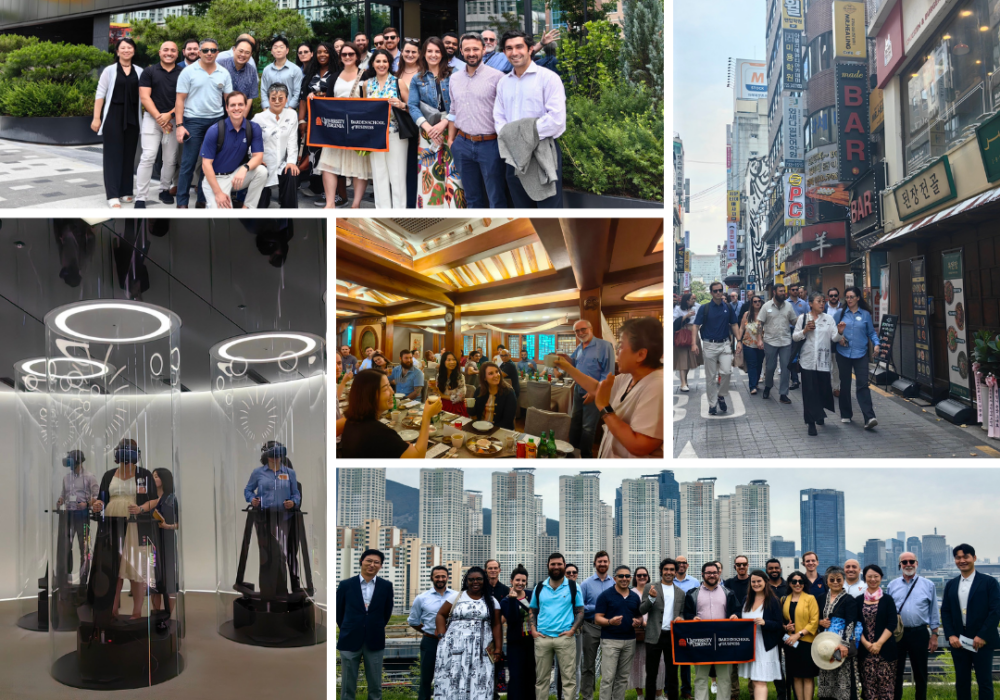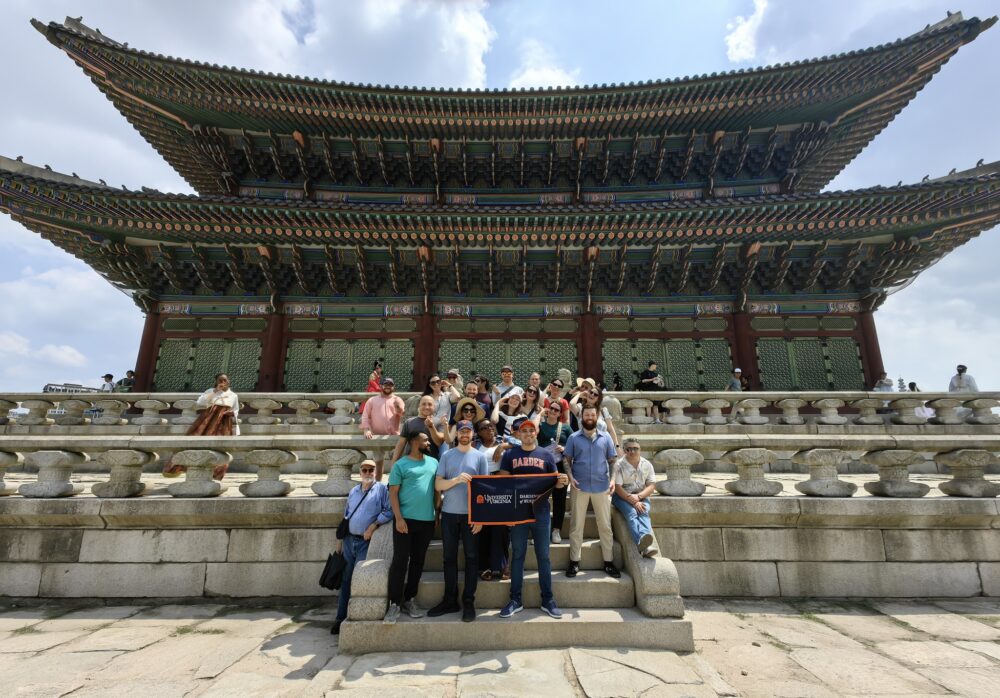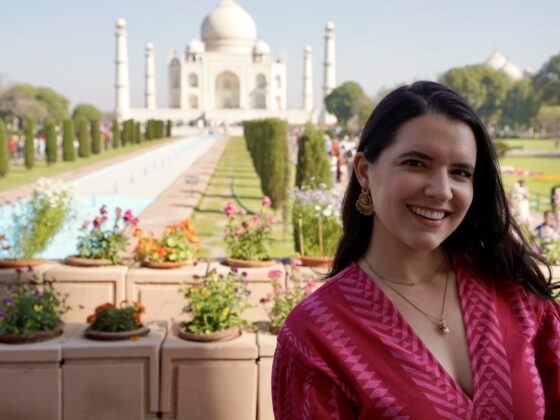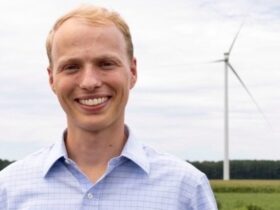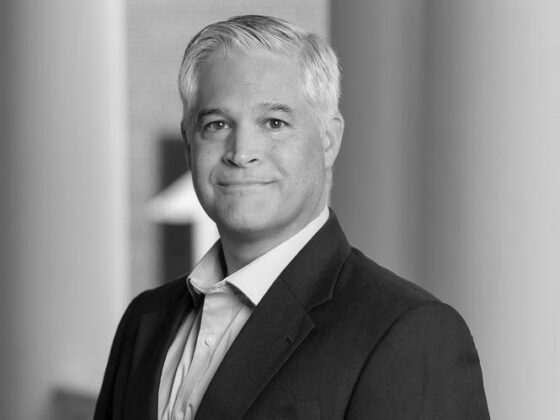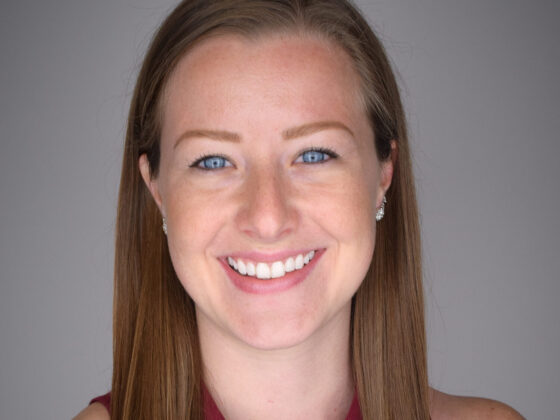Shizuka and Marc Modica design and deliver Global Residency (GR) Courses for Darden’s Executive MBA and Part-time MBA formats, and Darden Worldwide Courses (DWC) for the Full-time MBA format. Marc has been a Darden faculty member since 1998, teaching Communication, Negotiation, and Conflict Transformation. He has taught over 40 global Darden courses in Asia, South and Central America, Northern Europe, and the Middle East. Shizuka teaches Organizational Behavior, Leadership Theory, and Meaning Making at Kyoto College of Graduate Studies for Informatics. Shizuka has been an adjunct faculty member at Darden since 2018. She also teaches leadership development courses through UVA’s School of Continuing and Professional Studies. Both Marc and Shizuka also consult and teach in executive education programs.
Most recently, the Modicas taught a Global Residency in South Korea for the EMBA (Executive MBA) Class of 2025. Following the program, they reflected on this latest excursion and their experiences teaching global courses over the years. In their own words:
What we do
For the last six years, the two of us have, together, designed and delivered multiple courses in Japan and South Korea. We find each group of students and each location distinctively challenging and rewarding. With each having its own character, nothing ever stays the same from year to year, course to course.
Yet there are themes that run through these offerings and a unifying philosophy that binds them. We approach each course as a Community of Inquiry, driven by curiosity in the culture, economy, business practices, political climate, collective identity, and ambitions of the country and people we visit. We, along with the Center for Global Initiatives (CGI), determine the program theme, and design corporate visits and cultural explorations. In addition to big group activities, we offer as many small-group explorations as possible for more intimate engagement and shared learning from a wide range of activities. We aim to uncover and explore the complexity of a country. The more diverse data points we can share, the better we understand; it’s like each one of us is a blind monk touching one part of a big elephant.
Prior to the in-country residency, students prepared briefing books on major topics about South Korea and developed a fundamental understanding of the country. Briefing topics were: Consumerism and Domestic Markets, Economy and Business, Education, Gender, Government/Political Climate/Military, Healthcare System, Mass Communication, Soft Power, and Religion. While we were in South Korea, through daily morning debriefs and postings of Last Thoughts of the Day on the online course platform, we tentatively and cautiously made meaning from our daily adventures. Reserving final judgment, we openly explored questions and hypotheses that emerged from our experiences. In so many ways, we see our responsibility as “asking provocative questions” and “facilitating the discussion.” Naturally, learning from this leadership development course is drastically different from one person to another. Furthermore, deep reflection doesn’t end when the residency does.
Our learning objectives for our June 2024 South Korea Global Residency focused on:
- How South Korean businesses compete globally
- The cultural underpinnings of South Korean innovation
- South Korean perspectives on business and leadership
- The future role of South Korea both economically and geopolitically
- Lessons learned from the interplay between innovation and tradition
- Each student’s own development as a global leader
Yet some of our most profound learning comes not by design, but through encounters with the unexpected and sometimes unimaginable!
When our underlying assumptions and expectations are violated, we tend to feel negative and react instead of responding. Immersion in unfamiliar and sometime indecipherable environments tends to reveal those unconscious underlying assumptions and expectations. Only then are we able to see how reactive we could be. This calls on us to explore options for how we might wish to respond. We believe Global Residencies provide the opportunity to discover who we are, self-reflect, and create choices for our further growth.
To this end, we designed the course to expose students to a wide range of experiences. And we try our best to “get out of the way” of students’ direct experiences with the local culture and people who live in the local community. What we cannot tell in advance is what site, event, visit, or chance encounter will have significant impact on students, as every student comes with a completely different set of experiences, backgrounds, and assumptions. To illustrate this point, getting rejected by a taxi driver or an eating establishment in a foreign country could be a life-changing experience for some students.
Why we do it
Students were exposed to a lot about business, the economy, and the culture of South Korea throughout the course. We encouraged everyone to view all these experiences and learnings as a distant mirror for our own reflection — a provocation of our own thoughts about the issues we face at home, in our countries, in our present and future workplaces. Together, as a Community of Inquiry, from morning through night, we explore a new and occasionally disorienting world. We relate our new discoveries to learnings from the first-year core curriculum; we draw comparisons from prior Global Residencies and personal travels; we recognize and rediscover ourselves; and we reinforce and reimagine our understandings and assumptions. And later, in the quiet of our own thoughts, we construct our own meaning and reconstruct ourselves. We cannot really understand South Korea in a short six days. But we can use the looking glass in our grip to reimagine and reflect.
What we did in South Korea
In a mere six days, we covered Seoul and Busan. For us, every visit and cultural activity is a critical part of the course design. Here are some highlights, from our perspectives.
In Seoul, we opened the program with Mr. Andy Kim, Executive in Technology, Cyber Security and Digital Transformation Citi. Our corporate visits ranged from SK Telecom, a conglomerate that is rolling out AI-managed air taxis and Energy X, an ESG sustainable architecture company, to SparkLabs, a global startup accelerator.
Sessions related to the Korean Wave (Hallyu) were very memorable. Dr. Kenneth Kim (Darden MBA ‘05) shared his insights on media and entertainment. Mr. Bernie Cho, President of DFSB Kollective, helped us understand his business, which provides digital media, marketing, and distribution solutions to 350+ Korean Pop music artists. To directly experience the power of Hallyu, we also had a K-Pop dance class where we learned the steps to “Dynamite” by K-Pop idols BTS.
In addition to these formal sessions, we visited the Gyeongbok Palace and Bukchon Hanok Village, and Jongmyo Shrine, a 13th century Confucian Garden and structure dedicated to the forefathers of the Joseon Dynasty. We also visited the War Museum of Korea, an extensive complex focusing on the Korean War and other conflicts in Korean history. Some of the students went on an optional tour of the DMZ, and they shared their observations there with the rest of us as we walked through the hall with the names of those who died in the early 1950s. This was a moving visit and a time for deep reflection.
To understand Busan’s economic development, we visited the Busan-Jinhae Free Economic Zone (BJFEZ), the Busan Port Authority, and Dongwon Global Terminal, a fully automated terminal in the new Port of Busan. The Port of Busan, ranked as No. 6 in the world, has ambitious strategies to become a major player despite significant competition against China and Singapore.
We were also lucky to visit Kiswire in Busan, a publicly traded wire company, for the third time. Every time we visit, we come away impressed about their deep commitment to the local community they operate in. Kiswire’s history shows it grew in collaboration with its people, community, and business partners including Japan, which occupied South Korea for 35 years. Kiswire represents the best practices of Stakeholder Theory and Conscious Capitalism.
At Daesun Soju, we learned a bit about how the company was responding to changing consumer tastes. We even tasted soju there! As no one at the company spoke English, we used a consecutive interpretation service to hear from the R&D Director who gave us a tour and answered questions.
Culture and businesses operation are quite different between Seoul and Busan. Every corporate visit and every cultural activity contributed to our understanding of the complexity of South Korea — even in a short six days. We believe every one of us developed an affinity for this country by the end of the residency.
What we observed
Alongside takeaways specific to companies and speaker sessions, we certainly witnessed and/or sensed challenges that are common across them. They are: age/position-driven seniority systems, long working hours, gender inequity, an aging population, the lowest birth rate in the world of .72 births per woman, high costs of housing and education, the “Ppalli Ppalli” (hurry, hurry, quick) culture, prestige-seeking society, the highest suicide rate among OECD nations, and more.
Relationships, seniority, and gender greatly determine how people behave in business settings in South Korea. So, in the third year of planning the residency in South Korea, we came to the point in curating each session where we can ask for a specific structure of our visit based on the relationships we have built and knowledge of the company’s seniority dynamics. It’s been quite fascinating to observe how seniority by age, rank, and gender plays out when we visit different companies. We are very appreciative of a very frank talk with those whom we have a good relationship with after visiting them multiple times.
What students learned about global leadership
It is hard for us to know what students learned about leadership from this course and/or through their interactions with South Korean businesspeople and others. Yes, there may have been immediately transformational experiences and incidents that students can pinpoint; however, the impact of higher education is for the long term. Students’ end-of-the semester final deliverables can indicate that the course was helpful in reflecting on who they are, envisioning what type of a global leader they want to become, and what skills, knowledge, and behavior that they would like to develop in the future. Consequently, the true impact of global courses is immediately unknown.
We often hear from students — sometimes in their thirties, forties and beyond — how “transformative” and “eye-opening” these courses are. They are quick to share their favorite memories from class or with their colleagues. Conversely, we believe that even those students who recall a negative experience during the residency greatly benefit from the reflection process and charting their own path for personal and professional development. It’s about discovery and growth.
